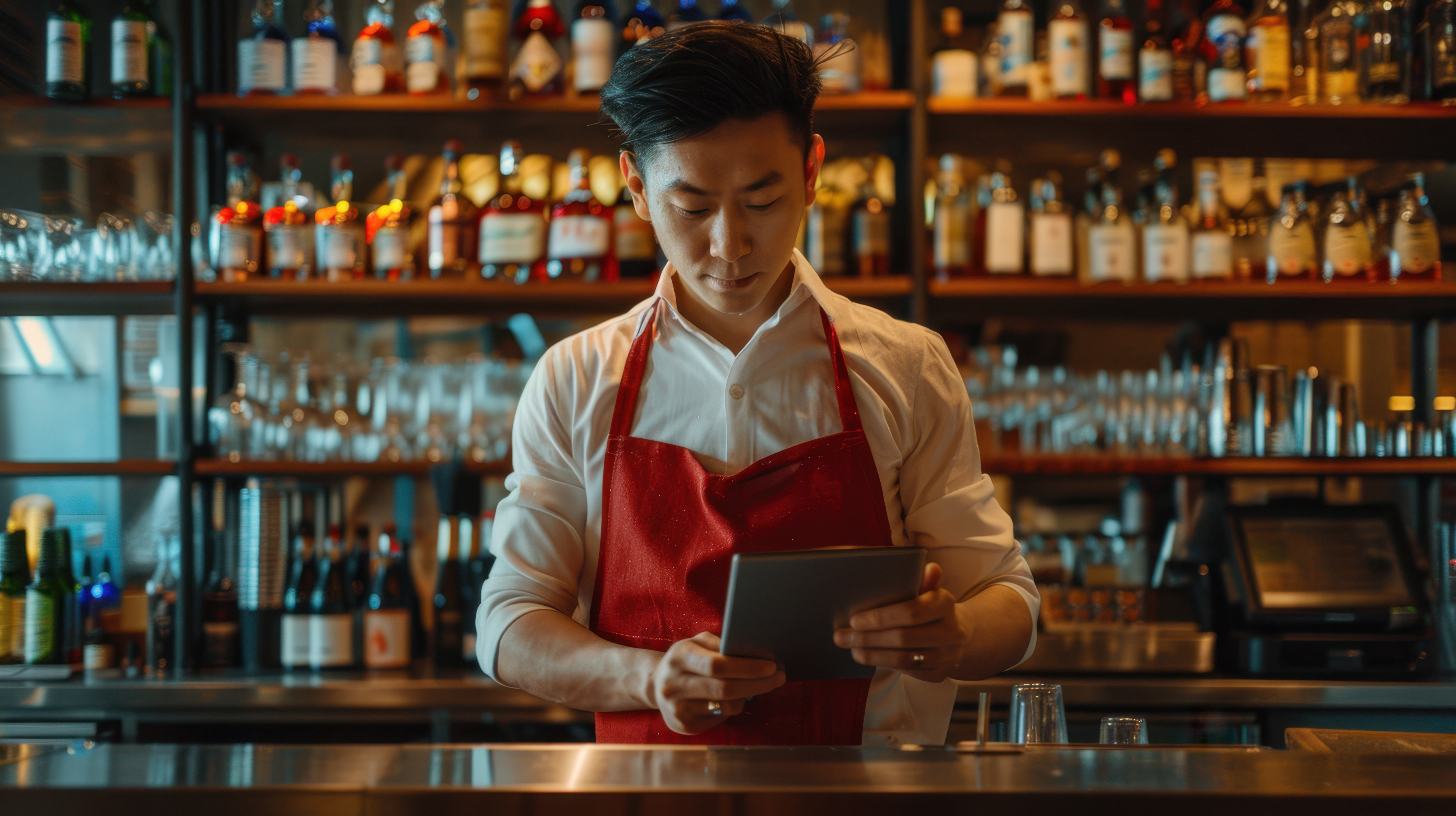How to Choose the Best POS System for Your Bar & Nightclub
Selecting the right bar POS system is crucial for the success of your bar or nightclub. This guide will walk you through the key factors to consider when choosing the best POS system for your business.

Contents
- What Is a POS System
- How to Choose the Best Bar POS System
- 1. Is the POS System Flexible
- 2. Does the POS System Have Relevant Features
- 3. Is the POS System Affordable
- 4.Is the POS System Open Source
- 5.Is the POS scalable
- 6. Is the interface intuitive
- 7. How hard is it to set up
- 8. How good is the customer support
- 9. Does the POS provide CRM features
- 10. How in-depth are the data and analytics
- Maximize Potential of Your Bar & Nightclub with Eats365 POS System
What Is a POS System?
A Point-of-Sales (POS) system is a combination of hardware and software that allows businesses to process transactions and manage operations. In restaurants, the POS system serves as the central hub where orders, payments, and inventory meet.
Today’s POS systems integrate tools for payment processing, kitchen management, sales analytics, and even customer relationship management (CRM).
Read more: What is a POS System? How Does It Work in Restaurants? (eats365pos.com)
How to Choose the Best Bar POS System
Not all POS systems are created equally, and it is important for you to select a system that fits your bar's business model. Essentially, your bar POS system should offset its cost and turn into a value-adding asset that your business can use to increase staff efficiency, boost turnover and raise profits.
To find the one that fits your bar's unique needs, ask yourself the following 10 questions:
1. Is the POS System Flexible?
Flexibility in a bar POS system is key in ensuring that the POS system can adapt to your business and not the other way around. A good POS system will be flexible enough to fit perfectly with your business model and strategy so it can easily add value and turn into an asset.
One way to consider how flexible a bar POS system is is by considering if they offer extension modules along with their POS. The best bar POS system should offer add-ons that range from kitchen display systems to mPOS solutions to self service kiosks. These terminals should work seamlessly with the POS and help smoothen your bar's operations. A good POS solution provider should also be willing to work with your business to accommodate any special requests you may have.
2. Does the POS System Have Relevant Features?
Depending on what your bar requires, many POS systems may be too simple or too complicated in terms of the features they offer. It is best to make a list of the most important features you need before searching for a new bar POS system.
For example, do you need digital menu, table tracking, scan-to-order, split bills, e-wallet payment options, printing or printer requirements, orders to be fired to specific kitchen stations, menu management tools, etc. By knowing what general features you require, it'll be much easier to find your perfect bar POS fit.
Read more: 6 Important Restaurant POS Features That Are Often Overlooked (eats365pos.com)
3. Is the POS System Affordable?
This one is pretty self-explanatory, but if you're investing more in a POS than it offers back to you, it's likely not your ideal match.
Some things to consider about POS system price include, what are the gains in efficiency you might see, will you see reduced losses through features like inventory tracking or pricing controls, will your POS system provide the data to help you market better to customers, how hefty is the upfront payment and are you locked in for a long period of time, is the POS provider interested in aiding you throughout the process?
4.Is the POS System Open Source?
A POS system that's open source is a must for most modern businesses.
An open source system essentially allows third-party companies to integrate into the POS system's architecture and work seamlessly as one unit. For example, if you have individual bar taps for customers to use that measure the amount they drink, this feature can be integrated directly into your bar POS system for a custom solution. Open source POS systems also allow integration from local payment providers so you can let your customers pay in ways that are convenient and relevant. The possibilities with an open source POS system are endless.
Read more: Eats365 App Store | Optimize Operation with 100+ Integration (eats365pos.com)

5.Is the POS scalable?
A scalable POS system is one that is able to grow with your business as it grows. Put simply, if you expand your bar & nightclub business, your POS system should be able to run throughout multiple store locations and even across different countries.
Scalability is often known as enterprise POS features, and should allow a complete experience for businesses who operate on a larger scale. Be it customer data, sales information or even menu management, you should be able to control everything, across multiple shops, from a single, convenient location.
Read more: 5 Key Features An Enterprise Restaurant POS System Should Have (eats365pos.com)
6. Is the interface intuitive?
A hidden cost of getting a new bar POS is in how long it takes staff to get used to the system.
Training, if complex, can take weeks and that bites into profits. A simple user interface that's still robust enough to be rich in features is a difficult balance to strike. Make sure that your bar POS system isn't like a pilot's cockpit but is rather more like the interior of a car. It should be intuitive and familiar rather than something out of a sci-fi movie.
7. How hard is it to set up?
The setup costs of any POS system can be astronomical. On-site servers, a team of technicians, additional hardware, it all adds up.
Modern, cloud-based iPad POS systems are often a far more viable solution. Not only do such solutions not require any servers or technicians, but your bar POS can be downloaded as an app and run directly on the iPad itself. Better yet, you can simply log in and have access to all your data by downloading the app to multiple iPads. This essentially allows any bar business to be up and running in minutes. Additionally, updates can come in regularly and quickly, providing quality of life improvements and new features. All you need to do is hit the download button. Nice and simple.
Read more: 10 Major Advantages of a Cloud-based POS System for Restaurants (eats365pos.com)
8. How good is the customer support?
Having the support of a great customer service team is paramount when selecting the perfect bar POS system. As with any new technology, there is likely to be growing pains.
Be sure that the POS provider values your business and is willing to guide you through any issues or send someone over if you need help. Without such aid, navigating a new system can sometimes be an absolute nightmare.
9. Does the POS provide CRM features?
Bars very often have customers that come in time and time again. Why not incentivise these customers and turn newer customers into long-time patrons? CRM (customer relationship management) provides your business with the tools to view which customers spend the most, what they are likely to order, etc.
Based on these statistics, you can create a loyalty program that offers discounts or rewards to those customers who frequent your establishment the most. Be it a free drink after every ten beverages purchased, or a simple points system, you could stand out from the competition simply by knowing your customers on a more personal level.
10. How in-depth are the data and analytics?
Without a robust offering of figures, it becomes impossible to track the performance of your bar business. You want a system that does it all for you and packages your numbers in an easy-to-digest format. You also want a bar POS system that offers more than just simple sales data. If you need to isolate sales of a particular product over a set number of dates, your POS should allow you to do that.
Often, with solid data and analytics, you can start noticing patterns and use these observations to push the right products at the right time. For example, if you notice that mojitos do well during the summer, you can have a promotion for them to entice even more customers to come in. If you notice hot beverages do well in the winter, make specials or promotions that play right into your customers' desires.
You can also keep track of what products sell less at certain times and order less ingredients for those products. Essentially, you need a full financial map of your business so you can make informed decisions that help you save more and earn big!
Maximize Potential of Your Bar & Nightclub with Eats365 POS System
Choosing the best POS system for your bar or nightclub can be a game-changer. By considering factors mentioned above, you can find a system that meets your needs and helps your business thrive. With the right bar POS system, you can streamline operations, delight customers, and drive profitability like never before.